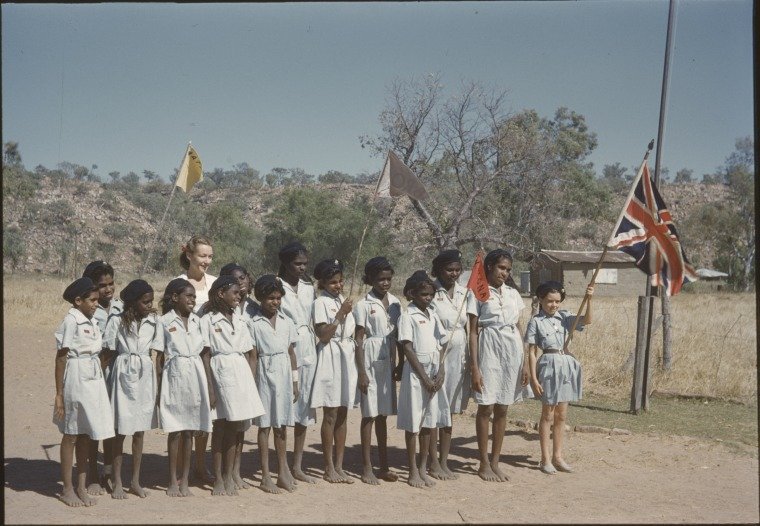History of the Apology
Stolen Children
Australia is home to the most ancient continuous civilisations on our planet.
However, as European colonists spread across our continent, these First Nations were subjected to systemic injustices. Indigenous peoples’ traditional lands were invaded, and their people massacred and pressed into forced labour.
Indigenous people contributed to building our national prosperity, fighting for Australia in both world wars. But their human rights were largely ignored. Aboriginal and Torres Strait Islander Australians were not entitled to vote, and were not even counted as human beings in the national census, until the 1960s.
As recently as the 1970s, Indigenous children were taken from their families under racist policies designed to assimilate them into white society. Away from their parents’ protection, these children endured extreme abuse - physical, psychological and sexual.
It is estimated that, during the active period of the policy, 10-30% of Indigenous children became members of the “Stolen Generations”.
I would not hesitate for one moment to separate any half-caste from its Aboriginal mother, no matter how frantic her momentary grief might be at the time.
They soon forget their offspring.
WA Protector of Aborigines James Isdell, 1908
Bringing Them Home
In 1995, Prime Minister Paul Keating’s government commissioned an independent human rights inquiry into the separation of Aboriginal and Torres Strait Islander children from their families.
The inquiry took evidence directly from 535 Indigenous people concerning their experiences of the removal policies. Hundreds more were recorded and submitted by Indigenous organisations.
Its final report, Bringing Them Home, recommended “an acknowledgement of responsibility and apology from all Australian governments, police forces and church institutions which implemented policies of forcible removal”. The states and territories made formal apologies, as did religious institutions that implemented the policies.
But the newly elected federal government, led by John Howard, insisted no apology was needed because forced removal was “believed to be in the best interests of the children concerned” at the time.
We weren't black or white. We were a very lonely, lost and sad displaced group of people… I know. I was one of them.
Quoted in ‘Bringing Them Home’, 1997
New Leadership
In November 2007, the Australian people elected a new government led by Kevin Rudd, who had committed to deliver the long-delayed apology.
On the first business day of parliament, the Prime Minister invited survivors of the Stolen Generations into the House of Representatives to hear Rudd speak the words they had waited decades to hear: “We are sorry.”
Rudd also committed to a national strategy of Closing the Gap. The initiative, proposed by Aboriginal and Torres Strait Islander Social Justice Commissioner Tom Calma, required all governments to publish data on different measures of inequality and stand accountable for their success or failure to achieve outcomes for Indigenous Australians.
Calma, in his response to the Apology, said: “Today’s actions enable every single one of us to move forward together – with joint aspirations and a national story that contains a shared past and future.”
We are the bearers of many blessings from our ancestors, and therefore we must also be the bearer of their burdens as well.
Kevin Rudd in 2008
National Unity
Brendan Nelson, the new leader of the opposition, bravely supported the Apology — even as Howard and some of his senior MPs boycotted it.
The critics variously denied history, warned of white resentment, and claimed it would burden the economy by unleashing legal chaos. One shadow minister even said he would resign from Nelson’s team rather than support the Apology.
The critics were wrong. Around Australia, communities gathered in their town squares to share in the Apology. Rather than dividing Australians, the Apology brought them together in the spirit of truth and healing.
Nelson’s speech, while criticised by some, was an important symbol of unity. Over the next week, dozens of his colleagues made speeches endorsing the Apology.
Public support for the Apology rocketed immediately afterwards, proving false the warnings of community division. Many of the most prominent opponents of the apology during the Howard era have since admitted they got it wrong.
Not knowing who you are is the source of deep, scarring sorrows, the real meaning of which can be known only to those who have endured it.
Brendan Nelson in 2008
Accountability
There are now 19 Closing the Gap targets spanning measures of health, education, employment, housing, incarceration, child protection, violence, mental health, connection to country, traditional languages and digital inclusion.
Each year, the Australian Parliament marks the anniversary of the National Apology by holding the prime minister of the day accountable for their government’s successes and failures to address Indigenous disadvantage.
Australians also gather in their workplaces and schools for National Apology Day breakfasts and other functions to remember what the First Australians have endured and reflect on the nation’s progress in advancing the cause of reconciliation.
Rudd announced the establishment of the National Apology Foundation in his valedictory speech to parliament in November 2013. Each year, he delivers a major address on reconciliation, typically at the National Apology Breakfast hosted by Message Stick.
A core focus of the Foundation will be Closing the Gap into the long-term future, and to help keep the national spotlight focused on this central critical objective.
Kevin Rudd in 2014
Images courtesy: SLWA, NLA, AHRC, AUSPIC, ACT for Kids





